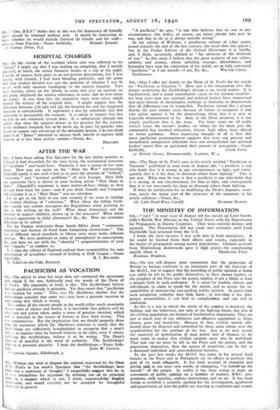PACIFICISM AS VOCATION Sat,—The article in your last issue does
not command the agreement with which I, for one, habitually read the words of the Dean of St. Paul's. His argument, in brief, is this: The Archbishops believe that the pacificist attitude is mistaken. Yet they assert that " pacificism is a vocation for some." This, says Dr. Matthews, implies that the Archbishops consider that some men may have a genuine vocation in Proclaiming that which is wrong.
Now unless all the sincere people in the world either reach unanimity or take vows of silence and inertia, it is inevitable that policies will be advocated and action taken, under a sense of genuine vocation, which Will be revealed in the course of history to have been wrong. This is a commonplace. But the implication that we should properly draw from the statement which Dr. Matthews criticises is surely that the Archbishops are sufficiently broadminded to recognise that a man's duty is to express what he himself believes to be right, even if others, including the Archbishops, believe it to be wrong. The Dean's criterion of morality is the word of authority. The Archbishops' aiterion is personal sincerity. I back the Archbishops.—Yours


























 Previous page
Previous page